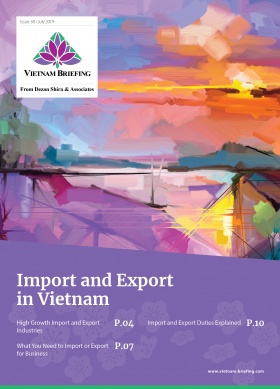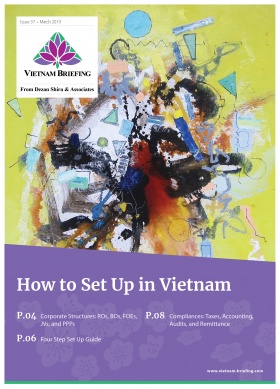The US-China Phase One Trade Deal and Vietnam
- The US and China in January this year signed a much-anticipated phase one trade deal.
- The deal allows for some relief to investors, but several questions remain as well as the long term sustainability of the agreement.
- Vietnam Briefing looks at the phase one trade deal and its impact and implications on Vietnam in the near term.
The US and China signed a much-anticipated phase one trade deal on January 15, 2020. This initial trade deal is seen as the first step towards a de-escalation of the US-China trade war now ongoing for more than 18 months.
But what does this mean for Vietnam?
Most people globally are hoping for an end to the trade war and will see this as beneficial to global trade. While this, to a certain extent is also good for Vietnam, the continuing trade war has obvious benefits for the country.
While the phase one deal is an important step in US-China relations it appears temporary and does not go into several details of existing tariff lines between the US and China. The phase one agreement is, however, a commitment by China to buy an additional US$200 billion worth of US goods over the next two years. This deal is seen as a way of managing US-China trade rather than dealing with specific Chinese tariffs. In addition, this agreement only covers US$134.2 billion out of the US$185.8 billion of total US exports to China in 2017.
The phase one deal also comes with certain caveats. For example, if the US believes that China does not buy enough from the US and therefore does not keep its end of the deal, the US can retaliate with additional tariffs.
While the US has scrapped further tariffs that were due to come into effect in December last year, 25 percent of tariffs on US$250 billion worth of Chinese goods remain in place.
Given these recent developments as well as the coronavirus outbreak in China, the phase one deal is not expected to have an immediate and profound effect on Vietnam. We look at the reasons why.
Vietnam likely to weather the impact of phase one deal
The China plus one effect: Several manufacturers have already moved operations to Vietnam as a result of the US-China trade war. These include investment in factories, office buildings, and staff. This is not limited to non-Chinese investors. China’s retaliatory tariffs on the US have also pushed some Chinese investors to alternative destinations. Given Vietnam’s rise as an investment destination, switching back to China would be costly.
Vietnam’s free trade agreements: As an export-led economy, Vietnam has been active in signing several free trade agreements (FTAs). FTAs, such as the Comprehensive and Progressive Agreement for Trans-Pacific Partnership (CPTPP) and the Vietnam – EU (EVFTA) will ensure that Vietnam remains a competitive investment destination. The standard of product quality, manufacturing and employee rights guaranteed in these agreements will continue to enable Vietnam to become a manufacturing hub and expand as an exporting base.
Origin fraud: Vietnam has been working harder to tackle origin fraud and transshipment. It recently introduced Resolution 119 to promote cooperation among government agencies on information sharing and the product inspection process. Vietnam customs have also stepped up its enforcement efforts which US authorities have appreciated.
Trade surplus: According to a Bank of American Merrill Lynch study, Vietnam’s trade surplus with the US has grown to US$600 million. Too alleviate US concerns, Vietnam is working to reduce the trade surplus by buying US Boeing jets and energy products as well as cracking down on Chinese manufacturers who reroute goods to bypass tariffs.
Supply chains vulnerable
Another aspect to note is that the US may not want another disruption to US supply chains in Asia given concerns from American manufacturers. This has been compounded due to the ongoing COVID-19 outbreak in China.
Nevertheless, Vietnam will need to remain vigilant. As mentioned earlier, the US in 2019 imposed duties on aluminum and steel products on Vietnam contending that certain products were produced in South Korea and Taiwan. Prior to that in 2017, it imposed duties on Vietnam for steel products originating from China.
While the phase one deal may ease tensions between the US and China in the short term, several issues remain unresolved and as such the two countries may return to trade tensions and new tariffs.
The China plus one strategy
The manufacturing shift to Vietnam associated with the trade war has been in the making for a number of years; China is not out of the picture altogether. In addition, given China’s size, its well-oiled supply chains, and raw materials – no one country has the capability to absorb all of China’s manufacturing including Vietnam.
Instead of abandoning the Chinese market, investors are choosing to supplement Chinese operations with low-cost inputs sourced from production facilities in markets such as Vietnam. Vietnam itself depends on China for several raw materials from China for several industries such as textiles, rubber, and plastic.
The recent coronavirus has already put pressure on supply chains in Vietnam. Industry leaders have warned that if inputs are not available by the end of February, investors would have to look at alternative sources such as India, Malaysia and China as a temporary solution.
Trade war has upended supply chains
The two years of the US-China trade war has pushed investors to find new suppliers, sell to different markets and diversify their operations. With much of the tariffs still remaining, investors exposed to the trade war’s costs remain less upbeat. The trade war has therefore shaken existing supply chain relationships pushing investors to forge new partnerships with a renewed focus in emerging markets.
The manufacturing shift has already begun. It is in this context that Vietnam benefits, and as long as it continues to play its cards right, can continue to attract further investment, even if there is a thawing in the US-China relationship.
About Us
Vietnam Briefing is produced by Dezan Shira & Associates. The firm assists foreign investors throughout Asia from offices across the world, including in Hanoi and Ho Chi Minh City. Readers may write to vietnam@dezshira.com for more support on doing business in Vietnam.
- Previous Article Vietnam Manufacturers Facing Shortage of Chinese-Made Components: Contingency Plans
- Next Article Bildung in Vietnam: Chancen und Herausforderungen







